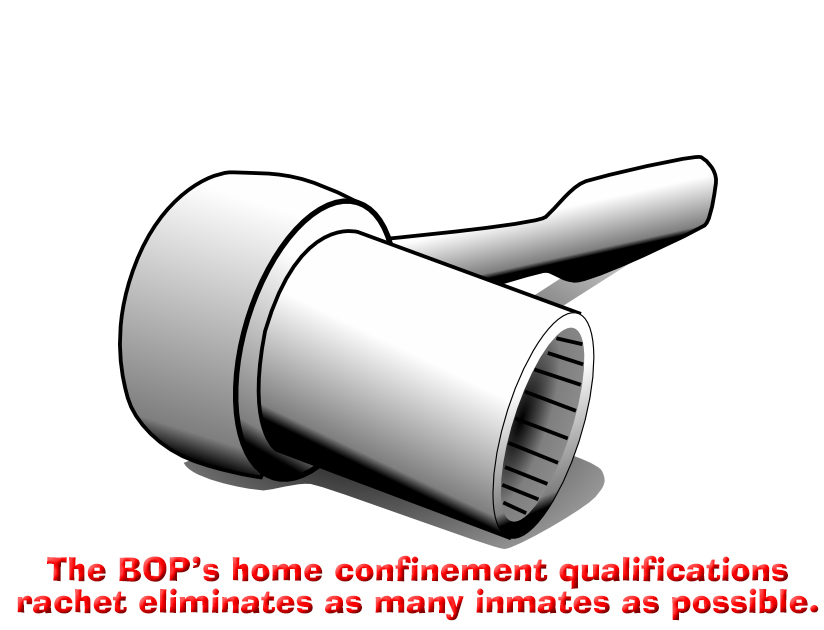We post news and comment on federal criminal justice issues, focused primarily on trial and post-conviction matters, legislative initiatives, and sentencing issues.

INTERNAL MEMO TOUGHENS CARES ACT HOME CONFINEMENT STANDARDS
 A recently-released prisoner complained to a TV station that FCI Butner was “slow-rolling” COVID-19 releases. A 76-year old federal prisoner told the Wall Street Journal that so far has been unable to convince officials to release him despite his age and history of respiratory problems. “It’s like pushing a wet noodle up the hill with your nose,” he said said. An attorney representing the plaintiffs in the FCI Oakdale lawsuit complained last Monday that only three Oakdale prisoners have been given CARES Act releases. The Houston Chronicle said last Thursday that “as the coronavirus crisis raises concerns about mass infections at prisons and jails, few federal prisoners from southeast Texas have cleared the gauntlet for compassionate early release.”
A recently-released prisoner complained to a TV station that FCI Butner was “slow-rolling” COVID-19 releases. A 76-year old federal prisoner told the Wall Street Journal that so far has been unable to convince officials to release him despite his age and history of respiratory problems. “It’s like pushing a wet noodle up the hill with your nose,” he said said. An attorney representing the plaintiffs in the FCI Oakdale lawsuit complained last Monday that only three Oakdale prisoners have been given CARES Act releases. The Houston Chronicle said last Thursday that “as the coronavirus crisis raises concerns about mass infections at prisons and jails, few federal prisoners from southeast Texas have cleared the gauntlet for compassionate early release.”
A lot of criticism. And what does the BOP say in its defense?
The BOP says it has been releasing inmates at a prodigious rate, with more than 1,119 sent to home confinement as of last Wednesday. Most recently, the entire population of FCI Otisville camp (111 inmates) was sent to quarantine in preparation for release to home confinement.
But those who suggest that the BOP talks one game while playing a different one might point to an internal guidance memorandum the BOP issued to its staff last week, one that restricts those who can go to home confinement well beyond what Attorney General Barr directed.
 In an affidavit filed in the Western District of Louisiana, an FCI Oakdale Associate Warden reported that “on April 15, 2020 we received a memorandum from BOP’s Correctional Programs Division, confirming the factors to be used when reviewing and referring inmates for home confinement. These factors remain: 1) Primary or prior offense is not violent; 2) Primary or prior offense is not a sex offense; 3) Primary or prior offense is not terrorism; 4) No detainer; 5) Mental Health Care Level is less than IV; 6) PATTERN… score is Minimum; 7) No Incident Reports in the past 12 months; 8) US Citizen; and 9) have a viable release plan.”
In an affidavit filed in the Western District of Louisiana, an FCI Oakdale Associate Warden reported that “on April 15, 2020 we received a memorandum from BOP’s Correctional Programs Division, confirming the factors to be used when reviewing and referring inmates for home confinement. These factors remain: 1) Primary or prior offense is not violent; 2) Primary or prior offense is not a sex offense; 3) Primary or prior offense is not terrorism; 4) No detainer; 5) Mental Health Care Level is less than IV; 6) PATTERN… score is Minimum; 7) No Incident Reports in the past 12 months; 8) US Citizen; and 9) have a viable release plan.”
The BOP criteria are more restrictive than what Barr specified in his March 26th and April 3rd memos. Barr only made violence, sex or terrorism disqualifying if any of those was present in the offense of conviction, the crime for which the inmate is now serving time. Plus, Barr did not outright disqualify for an incident report in the past year, or a PATTERN score above minimum. Rather, his memo merely said that such factors “would not [be] receiving priority treatment,” implying that they would be weighed against other factors.
The AG directed the BOP that “in assessing which inmates should be granted home confinement pursuant to this Memorandum, you are to consider the totality of circumstances for each individual inmate, the statutory requirements for home confinement, and the following non-exhaustive list of discretionary factors…” But that would require that the BOP make individualized judgments, and God forbid a bureaucrat would have to make a judgment that could boomerang on him or her.
 By making any incident report in the last year disqualifying, the BOP places possession of a cellphone (a “107” infraction) on the same plane with grabbing an extra kiss from your spouse in the visiting room (a “409” infraction). By deciding that any prior crime of violence is disqualifying, the BOP equates rioting last year with throwing a punch at a bar 40 years ago. What’s worse, the BOP believes that possessing a gun during a drug offense – even if the gun was never handled or displayed – is a crime of violence.
By making any incident report in the last year disqualifying, the BOP places possession of a cellphone (a “107” infraction) on the same plane with grabbing an extra kiss from your spouse in the visiting room (a “409” infraction). By deciding that any prior crime of violence is disqualifying, the BOP equates rioting last year with throwing a punch at a bar 40 years ago. What’s worse, the BOP believes that possessing a gun during a drug offense – even if the gun was never handled or displayed – is a crime of violence.
It’s a great substitute for actually thinking, and it hardly represents considering “the totality of the circumstances,” but it makes things easy for BOP staff. At the same time, it makes the likelihood of CARES Act home confinement for anyone other than a camper problematical. At FCI Elkton, only six inmates have been approved for home confinement, while 32 medically-eligible inmates have been denied. At Oakdale, of 68 inmates who are 65 years old or older, 75% are ineligible. Only six of the remaining inmates have gone to home confinement.
That 85-year old wheelchair-bound inmate who was convicted of a barroom assault back in 1956? Well, he can take his chances on COVID-19 inside…
WRAL-TV, Raleigh, N.C., Former inmate says Butner officials ‘slow-rolling’ prisoner releases during pandemic (Apr. 14)
WCTI-TV, New Bern, N.C., Ex-Trump lawyer Michael Cohen to serve out prison sentence at home (Apr. 17)
Houston Chronicle, ‘Crammed in’ and terminally ill: Prison officials drag their feet as vulnerable inmates seek release (Apr. 17)
Livas v. Myers, Case No. 20cv422 (WDLa), Declaration of Juan A. Segovia, filed Apr 16, 2020, Dkt 14-1
– Thomas L. Root

